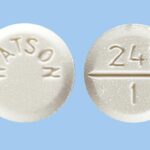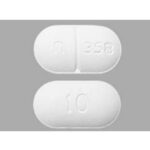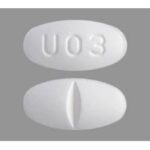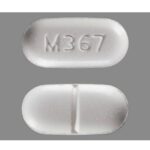What Does Watson 853 Pill Contain?
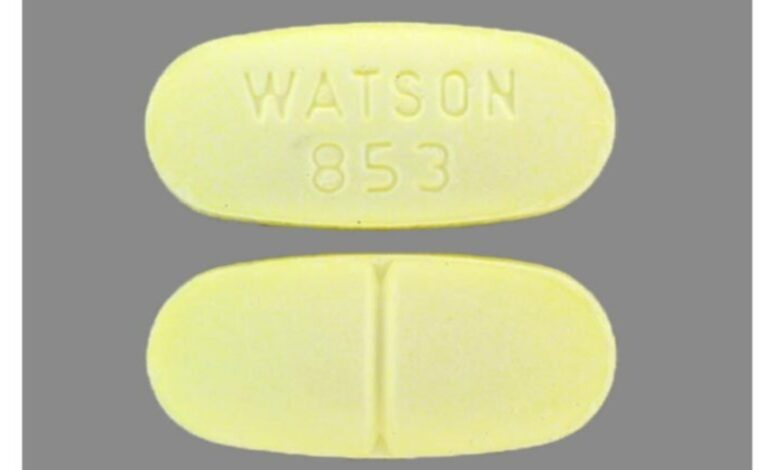
The yellow elliptical / Oval pill with the imprint WATSON 853 has been identified as Acetaminophen and Hydrocodone Bitartrate 325 mg / 10 mg supplied by Watson Pharmaceuticals. Acetaminophen is used to relieve mild to moderate pain and to reduce fever. Acetaminophen may also be used to relieve the pain of osteoarthritis (arthritis caused by the breakdown of the lining of the joints).
Acetaminophen is in a class of medications called analgesics (pain relievers) and antipyretics (fever reducers). It works by changing the way the body senses pain and by cooling the body. Hydrocodone is a painkiller in the opioid family (related to morphine). Hydrocodone treats pain by changing the way your central nervous system responds to pain signals.
WATSON 853 pill is a prescription only medication that belongs to the drug class narcotic analgesic combinations it is classified as a Schedule 2 controlled substance under the Controlled Substance Act (CSA.)
How to use WATSON 853 (Hydrocodone-Acetaminophen)
Read the Medication Guide and if available, the Patient Information Leaflet provided by your pharmacist before you start taking this medication and each time you get a refill. If you have any questions, ask your doctor or pharmacist.
Take this medication by mouth as directed by your doctor. You may take this drug with or without food. If you have nausea, it may help to take this drug with food. Ask your doctor or pharmacist about other ways to decrease nausea (such as lying down for 1 to 2 hours with as little head movement as possible).
If you are using a liquid form of this medication, use a medication measuring device to carefully measure the prescribed dose. Do not use a household spoon because you may not get the correct dose.
The dosage is based on your medical condition and response to treatment. In children, the dosage is also based on weight. Do not increase your dose, take the medication more frequently, or take it for a longer time than prescribed. Properly stop the medication when so directed.
Pain medications work best if they are used as the first signs of pain occur. If you wait until the pain has worsened, the medication may not work as well.
If you have ongoing pain (such as due to cancer), your doctor may direct you to also take long-acting opioid medications. In that case, this medication might be used for sudden (breakthrough) pain only as needed. Other pain relievers (such as ibuprofen, naproxen) may also be prescribed. Ask your doctor or pharmacist about using this product safely with other drugs.
Suddenly stopping this medication may cause withdrawal, especially if you have used it for a long time or in high doses. To prevent withdrawal, your doctor may lower your dose slowly. Tell your doctor or pharmacist right away if you have any withdrawal symptoms such as restlessness, mental/mood changes (including anxiety, trouble sleeping, thoughts of suicide), watering eyes, runny nose, nausea, diarrhea, sweating, muscle aches, or sudden changes in behavior.
When this medication is used for a long time, it may not work as well. Talk with your doctor if this medication stops working well.
Though it helps many people, this medication may sometimes cause addiction. This risk may be higher if you have a substance use disorder (such as overuse of or addiction to drugs/alcohol). Take this medication exactly as prescribed to lower the risk of addiction. Ask your doctor or pharmacist for more details. Tell your doctor if your pain does not get better or if it gets worse.
Side Effects of Watson 853
The common side effects that accompany the administration of 853 watson include:
- Drowsiness
- Dizziness
- Nausea
- Vomiting
- Constipation
More serious side effects can sometimes accompany the administration of any of this drug can include:
- Drowsiness
- Difficulty breathing
- Hives
- Swelling of the face, lips, tongue or throat
- Decreased breathing, slow heartbeat
- Lightheadedness
- Confusion, unusual thoughts
- Convulsions
- Feeling anxious, fearful, or depressed; mood swings
- Difficulty urinating
- Upper abdominal pain, itching, little appetite, dark urine, clay-colored stools, jaundice
- Skin redness or rash that causes blistering and peeling
Safety of WATSON 853
This medication contains acetaminophen. Taking too much acetaminophen can cause liver damage, sometimes serious enough to require liver transplantation or cause death. You might accidentally take too much acetaminophen if you do not follow the directions on the prescription or package label carefully, or if you take more than one product that contains acetaminophen.
Hydrocodone combination products like WATSON 853 may be habit forming. Take your hydrocodone combination product exactly as directed. Do not take more of it, take it more often, or take it in a different way than directed by your doctor. While taking hydrocodone combination products, discuss with your healthcare provider your pain treatment goals, length of treatment, and other ways to manage your pain. Tell your doctor if you or anyone in your family drinks or has ever drunk large amounts of alcohol, uses or has ever used street drugs, or has overused prescription medications, or has had an overdose, or if you have or have ever had depression or another mental illness. There is a greater risk that you will overuse a hydrocodone combination product if you have or have ever had any of these conditions. Talk to your healthcare provider immediately and ask for guidance if you think that you have an opioid addiction or call the U.S. Substance Abuse and Mental Health Services Administration (SAMHSA) National Helpline at 1-800-662-HELP.
Hydrocodone may cause serious or life-threatening breathing problems, especially during the first 24 to 72 hours of your treatment and any time your dose is increased. Your doctor will monitor you carefully during your treatment. Tell your doctor if you have or have ever had slowed breathing or asthma. Your doctor will probably tell you not to take a hydrocodone combination product. Also tell your doctor if you have or have ever had lung disease such as chronic obstructive pulmonary disease (COPD; a group of diseases that affect the lungs and airways), a head injury, a brain tumor, or any condition that increases the amount of pressure in your brain. The risk that you will develop breathing problems may be higher if you are an older adult or are weak or malnourished due to disease. If you experience any of the following symptoms, call your doctor immediately or get emergency medical treatment: slowed breathing, long pauses between breaths, or shortness of breath.
When a hydrocodone combination product was used in children, serious and life-threatening breathing problems such as slow or difficulty breathing and deaths were reported. Hydrocodone should never be used to treat pain or a cough in children younger than 18 years of age. If your child is currently prescribed a cough and cold medicine containing hydrocodone, talk to your child’s doctor about other treatments.
Taking certain medications with a hydrocodone combination product may increase the risk of serious or life-threatening breathing problems, sedation, or coma. Tell your doctor if you are taking, plan to take or plan to stop taking any of the following medications: certain antifungal medications including itraconazole (Onmel, Sporanox), ketoconazole (Nizoral), and voriconazole (Vfend); benzodiazepines such as alprazolam (Xanax), chlordiazepoxide (Librium), clonazepam (Klonopin), diazepam (Diastat, Valium), estazolam, flurazepam, lorazepam (Ativan), oxazepam, temazepam (Restoril), and triazolam (Halcion); erythromycin (Erytab, Erythrocin); certain medications for human immunodeficiency virus (HIV) including indinavir (Crixivan), nelfinavir (Viracept), and ritonavir (Norvir, in Kaletra); medications for mental illness or nausea; other medications for pain; phenytoin (Dilantin, Phenytek); rifampin (Rifadin, Rimactane, in Rifamate); muscle relaxants; sedatives; sleeping pills; or tranquilizers. Your doctor may need to change the dosages of your medications and will monitor you carefully. If you take a hydrocodone combination product with any of these medications and you develop any of the following symptoms, call your doctor immediately or seek emergency medical care: unusual dizziness, lightheadedness, extreme sleepiness, slowed or difficult breathing, or unresponsiveness. Be sure that your caregiver or family members know which symptoms may be serious so they can call the doctor or emergency medical care if you are unable to seek treatment on your own.
Drinking alcohol, taking prescription or nonprescription medications that contain alcohol, or using street drugs during your treatment with a hydrocodone combination product increases the risk that you will experience these serious, life-threatening side effects. Do not drink alcohol, take prescription or nonprescription medications that contain alcohol, or use street drugs during your treatment.
Do not allow anyone else to take your medication. Hydrocodone may harm or cause death to other people who take your medication, especially children.
Tell your doctor if you are pregnant or plan to become pregnant. If you take a hydrocodone combination product regularly during your pregnancy, your baby may experience life-threatening withdrawal symptoms after birth. Tell your baby’s doctor right away if your baby experiences any of the following symptoms: irritability, hyperactivity, abnormal sleep, high-pitched cry, uncontrollable shaking of a part of the body, vomiting, diarrhea, or failure to gain weight.
Your doctor or pharmacist will give you the manufacturer’s patient information sheet (Medication Guide) when you begin treatment with a hydrocodone combination product and each time you refill your prescription. Read the information carefully and ask your doctor or pharmacist if you have any questions. You can also visit the Food and Drug Administration (FDA) website (http://www.fda.gov/Drugs/DrugSafety/ucm085729.htm) or the manufacturer’s website to obtain the Medication Guide.
Talk to your doctor about the risks of taking a hydrocodone combination product.

